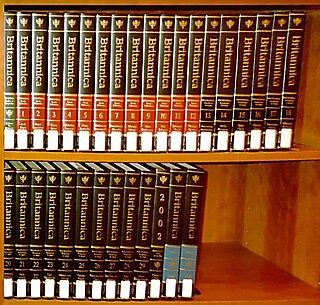
An encyclopedia or encyclopaedia is a reference work or compendium providing summaries of knowledge either from all branches or from a particular field or discipline. Encyclopedias are divided into articles or entries that are often arranged alphabetically by article name and sometimes by thematic categories. Encyclopedia entries are longer and more detailed than those in most dictionaries. Generally speaking, unlike dictionary entries—which focus on linguistic information about words, such as their etymology, meaning, pronunciation, use, and grammatical forms—encyclopedia articles focus on factual information concerning the subject named in the article's title.

The Encyclopædia Britannica is a general knowledge English-language online encyclopaedia. It was formerly published by Encyclopædia Britannica, Inc., and other publishers. It was written by about 100 full-time editors and more than 4,000 contributors. The 2010 version of the 15th edition, which spans 32 volumes and 32,640 pages, was the last printed edition.
February 25 is the 56th day of the year in the Gregorian calendar. 309 days remain until the end of the year.

Imam is an Islamic leadership position.

Woodwind instruments are a family of musical instruments within the more general category of wind instruments. Common examples include flute, clarinet, oboe, saxophone, and bassoon. There are two main types of woodwind instruments: flutes and reed instruments. The main distinction between these instruments and other wind instruments is the way in which they produce sound. All woodwinds produce sound by splitting the air blown into them on a sharp edge, such as a reed or a fipple. Despite the name, a woodwind may be made of any material, not just wood. Common examples include brass, silver, cane, as well as other metals such as gold and platinum. The saxophone, for example, though made of brass, is considered a woodwind because it requires a reed to produce sound. Occasionally, woodwinds are made out of earthen materials, especially ocarinas.
Pope Cornelius was the bishop of Rome from 6 or 13 March 251 to his martyrdom in June 253. He was pope during and following a period of persecution of the church and a schism occurred over how repentant church members who had practiced pagan sacrifices to protect themselves could be readmitted to the church. Cornelius agreed with Cyprian of Carthage that those who had lapsed could be restored to communion after varying forms of penance. That position was in contrast to the Novationists, who held that those who failed to maintain their confession of faith under persecution would not be received again into communion with the church. That resulted in a schism in the Church of Rome that spread as each side sought to gather support. Cornelius held a synod that confirmed his election and excommunicated Novatian, but the controversy regarding lapsed members continued for years.

The Encyclopædia Britannica, Eleventh Edition (1910–11), is a 29-volume reference work, an edition of the Encyclopædia Britannica. It was developed during the encyclopaedia's transition from a British to an American publication. Some of its articles were written by the best-known scholars of the time. This edition of the encyclopaedia, containing 40,000 entries, is now in the public domain, and many of its articles have been used as a basis for articles in Wikipedia. However, the outdated nature of some of its content makes its use as a source for modern scholarship problematic. Some articles have special value and interest to modern scholars as cultural artifacts of the 19th and early 20th centuries.

Canara is a stretch of land alongside the Arabian Sea in the Indian state of Karnataka. The region comprises three civil districts, namely: Uttara Kannada, Udupi, and Dakshina Kannada.

The House of Obrenović was a Serbian dynasty that ruled Serbia from 1815 to 1842, and again from 1858 to 1903. They came to power through the leadership of their progenitor Miloš Obrenović I in the Serbian Uprising of 1815–1817 against the Ottoman Empire, which led to the formation of the Principality of Serbia in 1817. The Obrenović dynasty were traditionally allied with Austria-Hungary and opposed the Russian-supported Karađorđević dynasty.

Encyclopædia Britannica, Inc. is a Scottish-founded American company known for publishing the Encyclopædia Britannica, the world's oldest continuously published encyclopaedia, as well as extensive digital efforts—including text and audiovisual—that are aimed at educational tools for primary and secondary schools, and for everyday learners accessing information through online search.

The mustard plant is a plant species in the genera Brassica and Sinapis in the family Brassicaceae. Mustard seed is used as a spice. Grinding and mixing the seeds with water, vinegar, or other liquids creates the yellow condiment known as prepared mustard. The seeds can also be pressed to make mustard oil, and the edible leaves can be eaten as mustard greens.

The French Community was an association of former French colonies, mostly from Africa. In 1958 it replaced the French Union, which had itself succeeded the French colonial empire in 1946.

A civil flag is a version of the national flag that is flown by civilians on nongovernmental installations or craft. The use of civil flags was more common in the past to denote buildings or ships not manned by the military.
This page is a glossary of architecture.
Events from the year 1880 in France.

The national symbols of England are things which are emblematic, representative or otherwise characteristic of England or English culture. Some are established, official symbols; for example, the Royal Arms of England, which has been codified in heraldry. Other symbols may not have official status, for one reason or another, but are likewise recognised at a national or international level.
A colorimeter is a device used in colorimetry that measures the absorbance of particular wavelengths of light by a specific solution. It is commonly used to determine the concentration of a known solute in a given solution by the application of the Beer–Lambert law, which states that the concentration of a solute is proportional to the absorbance.
Guild socialism is a political movement advocating workers' control of industry through the medium of trade-related guilds "in an implied contractual relationship with the public". It originated in the United Kingdom and was at its most influential in the first quarter of the 20th century. It was strongly associated with G. D. H. Cole and influenced by the ideas of William Morris.










